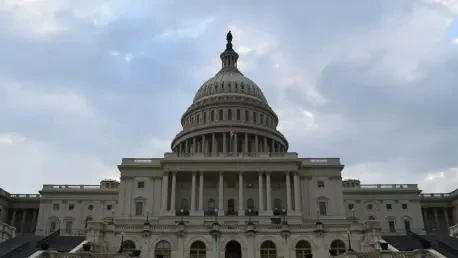As legislative dynamics evolve, the Senate’s consideration of President Trump’s megabill showcases an unprecedented interplay of party lines. This voting marathon has highlighted unique cross-party coalitions, reflecting broader shifts in political priorities. This roundup delves into experts’ and analysts’ perspectives, offering insights into the complexities and implications surrounding these legislative maneuvers.
The Unfolding Senate Marathon: Context, Challenges, and Controversies
The session has drawn significant attention due to its vast scope and contentious provisions. Analysts have noted the bill’s potential consequences on national deficits, sparking heated debates. This legislative endeavor is marked by its bold attempts at tax restructuring and reductions in federal programs like Medicaid. Political commentators observe this scenario as an opportunity to reassess priorities, grappling with the tension between efficiency and social safety nets.
Various experts contend with the megabill’s challenges, underlining the burdens such policy shifts impose on vulnerable communities. Advocacy groups for health and social support systems express concerns about the ramifications on nursing facilities and rural healthcare infrastructures. This marathon voting session thus reveals intricate disputes, both within the Senate walls and in public discourse, showcasing a legislative tableau of varied viewpoints and interest-driven strategies.
Preview of the Political Intrigue: Cross-party Coalition and Dissent
Republican Defectors: Unlikely Alliances Form Around Social Programs
Some industry leaders suggest the transformative potential as moderate Republicans like Senators Susan Collins and Lisa Murkowski have taken stands diverging from party orthodoxy. Their support for Democratic amendments aimed at strengthening Medicaid funding and community support services indicates unpredictable alliances shaping policy directions. Their actions underscore the emerging intersections between party loyalty and regional obligations, reshaping the legislative terrain around social agendas.
Collins and Murkowski’s backing of measures targeted at nursing homes and rural hospitals reflects a broader concern about potential bill impacts on local communities. Analysts point out that these instances epitomize how regional interests and party strategies may lead to unconventional legislative partnerships. Their steadfast resolve aligns with an urgency in addressing immediate social needs amidst sweeping budgetary cuts.
Democratic Strategy: Crafting Amendments to Appeal Across the Aisle
On the Democratic front, strategies to win cross-party backing have involved crafting amendments resonating with moderate Republican colleagues. Legislative observers praise this tactical approach, recognizing the leverage gained through bipartisan dialogues in influencing policy priorities. The Democratic maneuvering extends to securing improved Medicaid and food assistance provisions, indicating party strategies aimed at practical benefits for both vulnerable populations and cooperative governance models.
Amid efforts to counteract reductions in Medicaid and SNAP benefits, Democrats have found some support from Republican counterparts drawn by compelling regional implications. Some researchers posit that such cross-party collaboration can pave pathways to solutions that bridge political divides, tapping into potential avenues for progressive and equitable governance.
GOP Amendments: Unprecedented Democrat Support
Republican Senator John Cornyn’s amendment, aimed at curbing state healthcare expenses for undocumented migrants, received unexpected backing from Democrat senators. This moment of collaboration reveals nuanced concerns about fiscal responsibilities and state-specific needs, suggesting shifting perspectives in governance approaches. Experts highlight this as illustrative of broader tendencies to prioritize practical, regionally defined objectives over blanket party doctrines.
Focus on the regional impacts inherent in budgetary and policy modifications underscores these shifts. States at the epicenter of changes grapple with balancing financial burdens against community sustainability. Analysts probe deeper into the ramifications stemming from rigid budget frameworks, projecting long-term social and fiscal effects.
A Broader Lens: Understanding Transformative Forces in Legislative Dynamics
Political analysts emphasize the evolving nature of congressional discourse, as blurred party lines reflect new strategic realignments guiding future legislative constructs. Experts share insights into potential repercussions, suggesting that such shifts may inspire innovative policy processes and dialogues leading to coherent, forward-thinking governance.
Strategists forecast wider implications for legislative endeavors where stepwise policy crafting may lead to novel collaborations. This evolving dynamic offers opportunities to redefine governance models, capturing the essence of bipartisan partnerships driving tailored regional outcomes.
Lessons and Insights: Navigating Bipartisan Politics
Navigating today’s multicultural and multilateral political environment necessitates a nuanced understanding of bipartisan strategies. Lessons in effective legislative negotiation involve recognizing the importance of cross-party dialogue aimed at reconciling divergent policy goals with focused regional ambitions. Observers recommend tactical approaches that leverage the intricacies of cooperation, aiming to achieve legislative successes aligned with holistic governance visions.
Adaptable legislative frameworks could enhance future negotiations, fostering environments conducive to collaboration across party lines. Best practices involve tapping into multidisciplinary insights to navigate political complexities, highlighting constructive pathways and emphasizing bipartisan efficacy in achieving nuanced policy outcomes.
The Evolving Congressional Landscape and Its Broader Implications
The megabill offers a compelling case study in the legislative complexity and innovation defining contemporary governance paradigms. This session’s developments prompt reflections on enhancing progressive governance through strategic alliances. A broader understanding of these legislative shifts provides insights into optimized policy engineering, setting the stage for tactical advancements contingent on adapting political strategies to meet community needs.
The intricacies exposed during the Senate voting marathon spotlight an essential dialogue—one promoting progressive governance harnessed for future political success. Encouraging explorations into new governance approaches that resonate with societal expectations of equity and sustainability sets the foundation for future legislative constructs fortified by strategic alignment and forward-thinking policy crafting.









